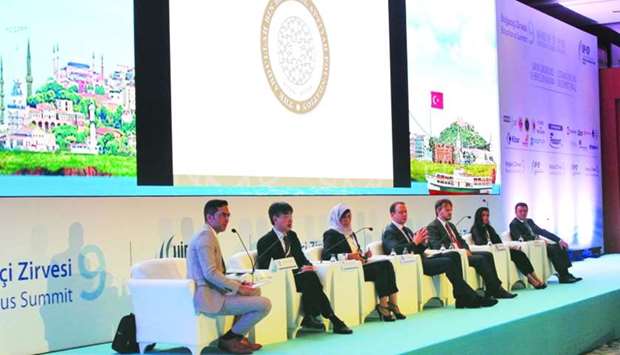In line with the vision of its chairman, HE Abdullah bin Hamad al-Attiyah, the foundation’s ongoing strategic partnership with the Uluslararasi Isbirlgi Platforumu, International Cooperation Platform (UIP-ICP), that manage the Bosphorus Summit annually, provides an opportunity to enhance proactive multilateral and inter-disciplinary co-operation for sustainable development.
The thought-provoking session opened by recognising al-Attiyah’s unique background. Al-Attiyah had occupied senior positions in both the energy industry as well as world-class initiatives to protect the environment and promote sustainability.
The speakers this year at the summit included Al-Attiyah Foundation associates from several organisations such as the International Monetary Fund (IMF), Gas Exporting Countries Forum (GECF), Oxford Institute for Energy Studies, The Hague Centre for Strategic Studies and Qamar Energy.
Dr Akito Matsumoto, IMF senior economist shared his analysis of the natural gas market during his presentation.
“First, our analysis finds that energy efficiency gain is offsetting demand growth from income growth for high income countries. Thus, energy demand growth comes from middle income countries. Second, among primary energy demand, growth for coal and oil will slow down and might stop a few decades later. However, our analysis finds no signs of natural gas demand slowing in foreseeable future.”
Mahdjouba Belaifa of the GECF further commented on the ongoing growth of natural gas, focusing on emerging markets. “Prospects for natural gas demand growth are considerable in existing markets and emerging markets such as Asean, Pakistan and Bangladesh, but also in emerging sectors such as natural gas powered vehicles (NGV) and LNG as a bunkering fuel. The GECF will continue to play a significant role in supplying such growing demand. Furthermore, dialogue, co-operation and greater advocacy for natural gas as a fuel of choice for sustainable development are key for the expansion of natural gas."
Clearly, the economics derived from the supply and demand of gas has changed considerably in the last twenty years. Prices have also changed significantly in key markets in Europe and Japan though, interestingly the US-based Henry Hub price has little changed.
Dr Jan Frederik Braun, Strategic Energy analyst, The Hague Centre for Strategic Studies commented on the Dutch energy industry and the role of gas in Europe.
He said, “The Netherlands is quickly shifting its role from the EU’s largest producer and exporter to a net importer of natural gas. The radical overhaul of the Dutch energy system is to a large extent representative of the whole of Europe: rapidly declining gas production, an increasing dependence on gas imports while phasing out coal and going for more renewables.”
The thought-provoking session opened by recognising al-Attiyah’s unique background. Al-Attiyah had occupied senior positions in both the energy industry as well as world-class initiatives to protect the environment and promote sustainability.
The speakers this year at the summit included Al-Attiyah Foundation associates from several organisations such as the International Monetary Fund (IMF), Gas Exporting Countries Forum (GECF), Oxford Institute for Energy Studies, The Hague Centre for Strategic Studies and Qamar Energy.
Dr Akito Matsumoto, IMF senior economist shared his analysis of the natural gas market during his presentation.
“First, our analysis finds that energy efficiency gain is offsetting demand growth from income growth for high income countries. Thus, energy demand growth comes from middle income countries. Second, among primary energy demand, growth for coal and oil will slow down and might stop a few decades later. However, our analysis finds no signs of natural gas demand slowing in foreseeable future.”
Mahdjouba Belaifa of the GECF further commented on the ongoing growth of natural gas, focusing on emerging markets. “Prospects for natural gas demand growth are considerable in existing markets and emerging markets such as Asean, Pakistan and Bangladesh, but also in emerging sectors such as natural gas powered vehicles (NGV) and LNG as a bunkering fuel. The GECF will continue to play a significant role in supplying such growing demand. Furthermore, dialogue, co-operation and greater advocacy for natural gas as a fuel of choice for sustainable development are key for the expansion of natural gas."
Clearly, the economics derived from the supply and demand of gas has changed considerably in the last twenty years. Prices have also changed significantly in key markets in Europe and Japan though, interestingly the US-based Henry Hub price has little changed.
Dr Jan Frederik Braun, Strategic Energy analyst, The Hague Centre for Strategic Studies commented on the Dutch energy industry and the role of gas in Europe.
He said, “The Netherlands is quickly shifting its role from the EU’s largest producer and exporter to a net importer of natural gas. The radical overhaul of the Dutch energy system is to a large extent representative of the whole of Europe: rapidly declining gas production, an increasing dependence on gas imports while phasing out coal and going for more renewables.”

